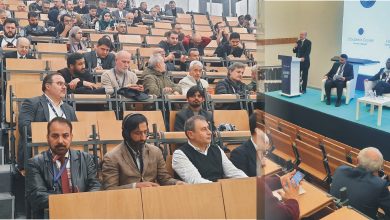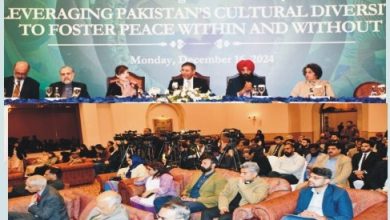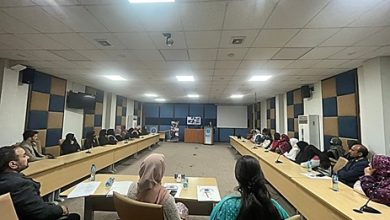Speakers at Islamabad seminar urge UN to uphold resolutions on Kashmir
 Islamabad: Speakers at a seminar in Islamabad raised serious concerns about the credibility of the United Nations, emphasizing the Indian government’s ongoing violations of UN Security Council resolutions regarding the Kashmir dispute.
Islamabad: Speakers at a seminar in Islamabad raised serious concerns about the credibility of the United Nations, emphasizing the Indian government’s ongoing violations of UN Security Council resolutions regarding the Kashmir dispute.
According to Kashmir Media Service, titled “United Nations and the Jammu and Kashmir Dispute,” the event coincided with UN Day and was organized by the Institute of Strategic Studies Islamabad (ISSI). It brought together academics, practitioners, think-tank experts, students, and media representatives.
Ambassador Sohail Mahmood highlighted the UN’s crucial role in the Kashmir conflict, commending its support for a solution based on relevant Security Council resolutions. He advocated for a free and impartial plebiscite under UN auspices, enabling Kashmiris to exercise their inalienable right to self-determination. He firmly rejected any attempts to equate this just struggle with terrorism and called on the international community to fulfill its commitments to the Kashmiri people, urging India to honor its own obligations. He stressed that the Pakistani and Kashmiri diaspora must actively raise global awareness through extensive parliamentary and media outreach.
DG ISSI Ambassador Sohail Mahmood emphasized the significance of UN Day as an opportunity for the international community to reaffirm its commitment to the UN Charter and multilateralism. While acknowledging the UN’s humanitarian efforts, he noted that both multilateralism and the UN institution are facing challenges from certain member states. He urged states and the UN to address international peace and security issues based on principles rather than power.
In his address, chief guest Ambassador Masood Khan, former President of Azad Jammu and Kashmir, reflected on the historical events leading to the ongoing Kashmir tragedy since 1947. He pointed out the geopolitical dynamics influencing major powers’ treatment of the issue, particularly during and after the Cold War. He remarked that justice often favors the stronger party, citing India’s actions in August 2019 as a clear indication of its intent to dominate the dispute. He underscored the urgent need for advocacy and mobilization to ensure recognition of Kashmiris’ rights.
Farzana Yaqoob condemned India’s settler colonialism and urged some Gulf Cooperation Council (GCC) states to reconsider their investments and partnerships with India. Dr. Marium Fatima highlighted the legal dimensions of the Kashmiri freedom struggle, affirming that the right to self-determination is universal and firmly rooted in UN Security Council resolutions. She condemned the misleading equating of Kashmir’s struggle with terrorism.
Altaf Hussain Wani addressed the implications of Hindutva ideology and demographic changes in IIOJK, noting that the abrogation of Articles 370 and 35A, along with domicile politics, serve to advance Modi’s agenda while undermining the Kashmiri freedom struggle. Despite ongoing structural violence, he asserted that the BJP has failed to achieve its objectives due to widespread resistance from Kashmiris.
Dr. Khurram Abbas, director of the India Study Centre, stated that since 1948, the UNSC has passed 18 resolutions related to the ‘India-Pakistan Question,’ many concerning the Jammu and Kashmir dispute. He criticized India for consistently rejecting these resolutions and imposing its will on the Kashmiri people through coercive tactics. He noted that the recent electoral process in IIOJK does not equate to ascertaining the wishes of the Kashmiri people, referencing UNSC Resolutions 91 of 1951 and 122 of 1957.
The seminar concluded with remarks from Ambassador Khalid Mahmood, chairman of ISSI, who emphasized the urgent need for the UN to focus on the Jammu and Kashmir dispute. He highlighted that this long-standing unresolved issue on the UN agenda remains critical for peace and stability in the region, particularly in a nuclearized environment.








